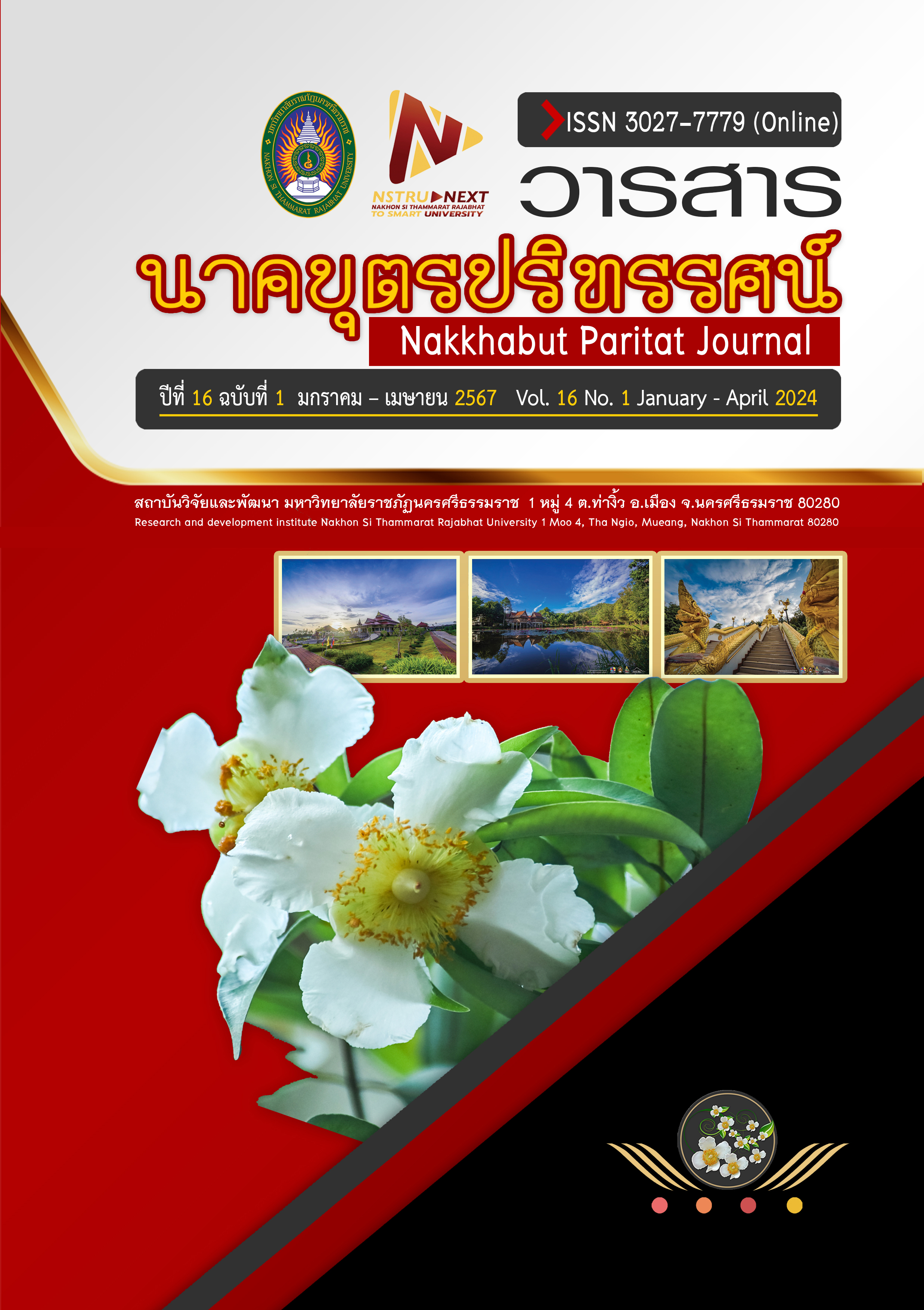การพัฒนาการเรียนรู้แบบมีส่วนร่วมสู่การสืบทอดภูมิปัญญาทางคติชนวิทยาของนักเรียนในศูนย์การเรียนรู้ตำรวจตระเวนชายแดนบ้านหลังอ้ายหมี
Main Article Content
บทคัดย่อ
การวิจัยครั้งนี้มีวัตถุประสงค์เพื่อศึกษาข้อมูลทางคติชนวิทยาในชุมชนบ้านหลังอ้ายหมีและพัฒนาการเรียนรู้แบบมีส่วนร่วมสู่การสืบทอดภูมิปัญญาทางคติชนวิทยาของนักเรียนในศูนย์การเรียนรู้ตำรวจตระเวนชายแดนบ้านหลังอ้ายหมีจังหวัดนครศรีธรรมราช โดยมีระเบียบวิธีวิจัยในการเก็บข้อมูลเน้นการเก็บข้อมูลเชิงปฏิบัติการแบบมีส่วนร่วม (Participatory Action Research : PAR) ซึ่งค้นคว้าหาข้อมูลจากเอกสารและงานวิจัยที่เกี่ยวข้อง จากนั้นเก็บข้อมูลทางคติชนในชุมชนและศูนย์การเรียนตำรวจตระเวนชายแดน บ้านหลังอ้ายหมี จากปราชญ์ชาวบ้านจำนวน 5 คน ชาวบ้านจำนวน 30 คน ครูจำนวน 12 คน นักเรียนในระดับชั้นประถมศึกษาตอนปลาย (ป.4-6) จำนวน35 คน
ผลการศึกษาพบว่า ข้อมูลทางคติชนวิทยาในชุมชนแบ่งออกเป็น 3 ประเภท คือ 1) มุขปาฐะ ได้แก่ คำกล่าว นิทาน เพลงกล่อมเด็ก ปริศนาคำทาย ความเชื่อ และภาษาถิ่น 2) อมุขปาฐะ ได้แก่ หัตถกรรม เครื่องแต่งกาย อาหารพื้นบ้าน และ 3) ข้อมูลประเภทผสม ได้แก่ เพลงบอก การละเล่น สามารถนำข้อมูลทางคติชนวิทยามาพัฒนาการเรียนรู้แบบมีส่วนร่วมสู่การสืบทอดภูมิปัญญาทางคติชนวิทยาของนักเรียนในศูนย์การเรียนรู้ตำรวจตระเวนชายแดนบ้านหลังอ้ายหมี ในชั้นประถมศึกษาตอนปลาย ผ่านกระบวนการอบรมเชิงปฏิบัติการ กิจกรรม คติชนพื้นบ้านบูรณาการศาสตร์ควรรู้ สู่การสืบทอดที่ยั่งยืน ผ่านกระบวนการเรียนรู้แบบมีส่วนร่วม 4 ขั้นตอน คือ 1) สำรวจจนรู้ครบ 2) พบจุดเชื่อมโยง 3) วางโครงลงมือปฏิบัติ และ 4) จัดความคิดเพื่อต่อยอด ทำให้นักเรียนเกิดการเรียนรู้ข้อมูลท้องถิ่น ฝึกปฏิบัติ และนำไปใช้ผ่านการเรียนรู้แบบมีส่วนร่วมเพื่อต่อยอดภูมิปัญญาพื้นบ้านในชุมชนของตนเอง
Article Details

อนุญาตภายใต้เงื่อนไข Creative Commons Attribution-NonCommercial-NoDerivatives 4.0 International License.
เอกสารอ้างอิง
Homfung, C. (2016). Folklore Teaching and Skill Development in the 21st Century of Learners and Promoting Pride in Thai Wisdom. Veridian E-Journal, Silpakorn University, 9,(2), 1549-1563.(in Thai)
Homfung, C. (2022). The Development of Folklore Teaching Approach by Creative Integration of Active Learning and Folklore Narratives for Enhancing Students’ Outcomes in the 21stCentury. Journal of Yala Rajabhat University. 17(1), 40. (in Thai)
Hongthong, W. (2023). Interview, 11 March 2023. (in Thai)
Kaewbuarat,S. (2023). Interview, 11 March 2023. (in Thai)
Kaewnil,T. (2023). Interview, 11 March 2023. (in Thai)
Khaemanee, T. (2017). Teaching Science: Body of Knowledge for an Effective Learning Process. Bangkok: Chulalongkorn University Press. (in Thai)
Kolb, D. A., & Fry, R. (1975). Toward an applied theory of experiential learning. In C. Cooper (Ed.), Studies of group process. New York: Wiley.
Kusolsong S. (2022). Development of ParticipatoryLearning Management Model embeddedMental Intelligence-Mentoring System-Project-based Activity–Research-basedLearningto StrengtheningSoft Skillsfor Rajabhat University Student Teachers. Journal of Education KhonKaen University, 45(3), 1-18. (in Thai)
Onwiset L. (2022). Interview, 16 December 2022. (in Thai)
Phetsong, K. (2023). Interview, 11 March 2023. (in Thai)
Phongsiang W. (2018). Learning package of “The Beauty of Roi – Et: Isan’s Saket” for Promoting Basic values and local conservation of the learning area of social studies religion and culture for Prathom 5 students. Academic Journal of Buriram Rajabhat University, 10(1), 97-110. (in Thai)
Rueangphet, N. (2023). Interview, 11 March 2023. (in Thai)
Rueangphet S. (2022). Interview, 3 December 2022. (in Thai)
Sudprasert, K. (1997). Worker Participatory Operational Research. Bangkok: OfficeHuman Resource Development Project Ministry of Education. (in Thai)
Srisa-at, B. (2002). Preliminary research. (7th ed.). Bangkok: Sureeriyasan. (in Thai)
Wisutruangdet, W. (2018). Study of Thai Songdam culture: Thai Songdam identity.Ban Don Subdistrict, U Thong District, Suphan Buri Province. (Research Report). Bangkok:Bansomdejchaopraya Rajabhat University.
Winitasathitkul, P. & Chiramethi, Ch. (2015). Folklore: Belief and Thai Society. Journal MCU Humanities Review 1(1), 35-42 (in Thai)


